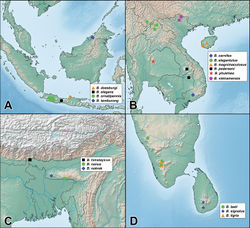Bolitogyrus phukhieo
| Notice: | This page is derived from the original publication listed below, whose author(s) should always be credited. Further contributors may edit and improve the content of this page and, consequently, need to be credited as well (see page history). Any assessment of factual correctness requires a careful review of the original article as well as of subsequent contributions.
If you are uncertain whether your planned contribution is correct or not, we suggest that you use the associated discussion page instead of editing the page directly. This page should be cited as follows (rationale):
Citation formats to copy and paste
BibTeX: @article{Brunke2017ZooKeys, RIS/ Endnote: TY - JOUR Wikipedia/ Citizendium: <ref name="Brunke2017ZooKeys">{{Citation See also the citation download page at the journal. |
Ordo: Coleoptera
Familia: Staphylinidae
Genus: Bolitogyrus
Name
Bolitogyrus phukhieo Brunke sp. n. – Wikispecies link – ZooBank link – Pensoft Profile
Type locality
Mon Lake, Phu Khieo Wildlife Sanctuary, Chaiyaphum, Thailand
Type material
Holotype (♂, ZMUC): THAILAND, Chaiyaphun [sic], Phu Khieo-Bung Mon, 1000 m, pitfall trap, 25 January 1989, M. Andersen & H. Read [printed] / HOLOTYPE Bolitogyrus phukhieo Brunke, des. A. Brunke 2017 [red label] / AJB0000392 [identifier label].
Diagnosis
Within the Carnifex Group: elytral disc entirely reddish (Fig. 1F); abdominal tergites III-V with relatively narrow dark markings at middle (Fig. 5B); peg setae arranged in both marginal and medial groups (Fig. 11O); antennomeres 8-10 quadrate; median lobe in parameral view with basal pair of teeth placed medially (Fig. 11M); apex of median lobe in parameral view acuminate (Fig. 11M).
Description
Measurements ♂ (n = 1): HW/HL 1.39; PW/PL 1.47; EW/ EL 1.21; ESut/PL 0.82; PW/HW 1.15; forebody length 6.1 mm.
Extremely similar to B. carnifex and differing only in the following: body with paler areas lighter, more orange-yellow; pronotum with smaller spot medially, with two lateral spots; abdominal tergites with narrower central dark markings, about one quarter of the tergal width; antennomere 10 slightly paler than 9; antennomeres 8-10 quadrate; pronotum wider than head; body smaller (based on single specimen); median lobe in lateral view evenly narrowed to smaller apex, apical portion only weakly flexed ventrad, apex with distinct median tooth arising from carina, basal teeth prominent and appearing near ventral face (Fig. 11N); median lobe in parameral view with apical portion more strongly acuminate, apex narrower and pointed, basal teeth located medially (Fig. 11M); paramere less strongly dilated at apical third, apical portion less strongly converging to truncate apex (Fig. 11O); peg setae in medial group larger than those of marginal group, medial group mostly at expanded area of paramere (Fig. 11O).
Distribution
Figure 20B. Bolitogyrus phukhieo is probably endemic to central Thailand.
Bionomics
The holotype was collected in a pitfall trap in January at an elevation of 1000 m.
Etymology
In recognition of Phu Khieo Wildlife Sanctuary, which encompasses the type locality: a remarkable bowl-like plateau raised out of the surrounding lowland landscape to approximately 800-1000 m. The sustainable conservation of Phu Khieo is the subject of a collaborative project between Thailand and the European Union.
Comments
Bolitogyrus phukhieo is most similar to allopatric B. elegantulus from northern Laos and southern Yunnan, China but can be distinguished by the acuminate apex of the median lobe in parameral view and the differently shaped paramere.
Original Description
- Brunke, A; 2017: A revision of the Oriental species of Bolitogyrus Chevrolat (Coleoptera, Staphylinidae, Staphylininae) ZooKeys, (664): 1-97. doi
Images
|



